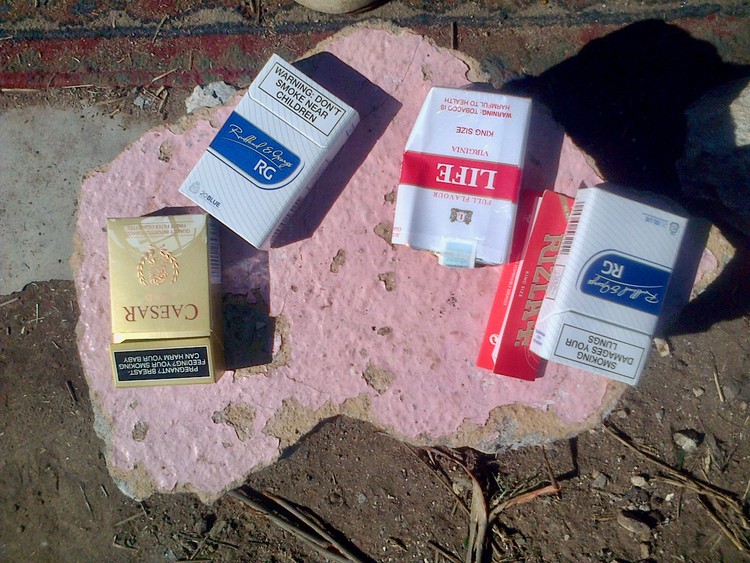In prison, cigarettes have always been currency. Now the whole country knows what it’s like.

Cigarettes are traded despite the Covid-19 lockdown regulations. Legal traders have lost significant income because of the restrictions. Photo: Mosa Damane / GroundUp
If the idea of the cigarette ban is to preserve the health of the nation, it’s not having much of an impact.
Smokers are getting their fix, albeit it at three times the usual price. And they’re trading down. Marlboro smokers are finding the much cheaper RG brand quite acceptable. A carton of 200 RG goes for R650 on the black market, but that price is going up as stock becomes harder to source.
When the ban is eventually lifted – either by government fiat or on the instructions of a high court judge – the cigarette market will likely be forever changed. Some of the 11 million smokers in South Africa may have ditched the habit, but others will have permanently switched brands, which should be good for lower-cost producers such as Gold Leaf, but not so good for higher-end producers such as BAT.
Sars has been snookered
And, as Tax Justice SA has pointed out, the illicit trade the SA Revenue Service (Sars) has worked so arduously to stamp out has resurfaced with a vengeance. This time, it won’t go away so easily, which means a permanent loss of revenue to Sars, which has already lost about R2 billion due to the ban.
The illegal trade, which never went away, now rules the market. The idea of stamping it out, even after the ban is lifted, seems hopelessly unrealistic.
As one senior business leader commented, this is what happens when bureaucrats and ministers run the economy. The ban has blown jumbo-sized holes in South Africa’s already porous borders.
Court challenge
In the meantime, the Fair-trade Independent Tobacco Association (Fita), representing smaller producers for the main part, says its court challenge against the government ban is likely to be heard two weeks from now.
It’s being brought as an urgent matter, but the hold-up is on government’s side.
It has been ordered by the high court to provide Fita with a record of decision showing how it came to the decision to impose the ban in the first place. This will allow Fita to supplement its affidavit and government will be given a few days to reply to that.
Fita chair Sinenhlanhla Mnguni is feeling the burn of 11 million smokers and eight producers on his neck every day: “Whether this ban is lifted by government or not, we have to go through with the case.
“The real issue here is whether government has the power to arbitrarily shut an industry based on no real data.”
DA leader John Steenhuisen told eNCA the responsible minister, Nkosazana Dlamini-Zuma (Cooperative Governance and Traditional Affairs), appears to be on a personal crusade when it comes to the cigarette ban, and is opposed by other ministers in her own cabinet.
It makes little sense, he says, to lift the ban on alcohol sales from 1 June but not on cigarettes.
The decision to impose the ban has been made for “health reasons”, but there is no basis in law for such a sweeping interpretation of the Disaster Management Act, according to Fita lawyers.
Several lawyers contacted by Moneyweb have argued the government should be on a hiding to nothing on this case.
Simon Rudland, co-owner of Gold Leaf Tobacco, says the company’s Johannesburg factory is able to operate at 30% staffing capacity, but only for export.
“There seems to be very little logic or reason behind the decision to ban cigarette sales, and we find it quite mystifying. We are coming up for the second month where we have to meet payroll and we’re unable to operate fully. I don’t know how much longer we can continue with this, and at what point we have to file for business rescue.”
Rudland says the group’s other businesses in Zimbabwe, Malawi, the Democratic Republic of Congo, Zambia and Kenya are all fully able to operate.
“South Africa is the only country in the world that has imposed a ban in this manner,” he says.
The losses are huge
In support of Fita’s court case, Gold Leaf CEO Ebrahim Adamjee outlined the impact of the cigarette ban on the company: in April and May 2019 it paid R437 million in excise to Sars, and a further R60 million in VAT. The loss to Sars this year for the same two-month period is likely more than R510 million, in addition to a daily loss of profit of R801,000 to the company, threatening the future of 354 workers and their families.
That story is being repeated across the tobacco manufacturing sector.
Moneyweb has learnt that several other groups may bring legal and other challenges to lift the ban, but more importantly to make sure government is never again able to shut down a part of the economy for no apparent reason.
Had the government invoked the State of Emergency Act rather than the National Disaster Management Act, it would have been subjected to far more scrutiny and restrictions than is currently the case.
If there is any certainty in this, it’s that this period of South Africa’s history has launched an armada of legal challenges that will roll out for years to come.
Republished from Moneyweb
For more news your way, download The Citizen’s app for iOS and Android.
Download our app